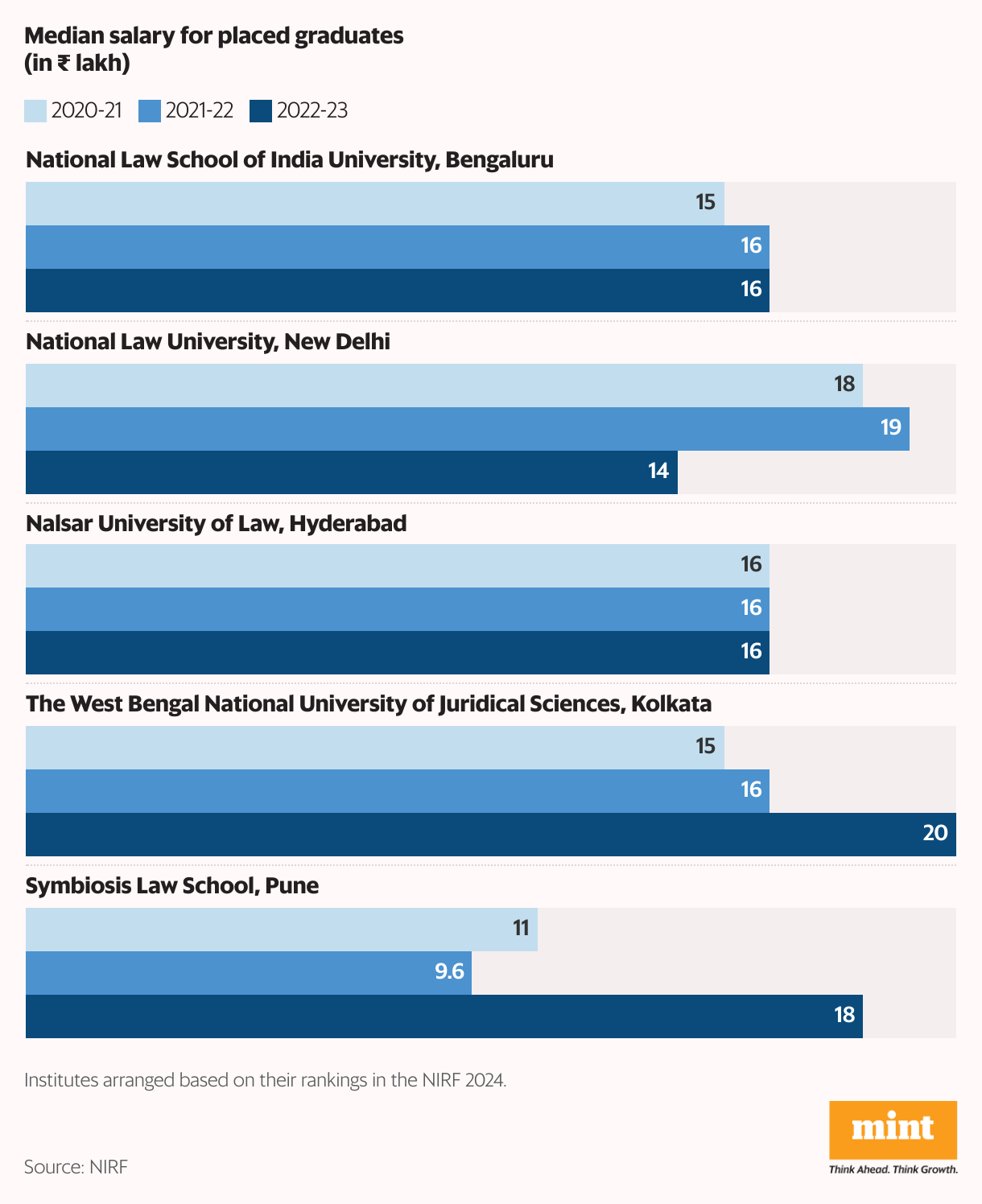As the 2024 academic year concludes, law graduates are entering a job market where their skills are more coveted than ever. Law firms across India have stepped up their hiring efforts and are offering higher salaries to attract fresh talent needed to navigate the complexities of a rapidly growing corporate landscape.
The fight for talent
Leading law firms have increased both hiring and salaries to prepare for the surge in legal services. Cyril Shroff, managing partner at Cyril Amarchand Mangaldas, said that while his firm has reduced salaries for new entrants, they have hired 170 graduates this year to build a strong foundation for future market demand.
Read this | IIM graduates face reality in tough job market
“With the expected growth in India Inc., the demand for legal professionals is poised to grow proportionally,” said Shweta Shroff Chopra, partner and board member at Shardul Amarchand Mangaldas. The firm, which has hired 10% more freshers this year, offers an average salary of ₹20 lakhs.
While Shroff Chopra did not reveal last year’s starting salaries, he confirmed that this year’s offers are higher.
Neha Gianchand, marketing director at Trilegal, which recruited 123 newcomers, stressed that the growing demand for legal services has contributed to higher retention levels for newcomers.
Corporate law firms have offered salaries ranging from ₹18-22 lakh this year for recruitments from top national law universities, according to Manoj Kumar Singh, director of placements at the National Law University, Jodhpur (NLUJ).
“All law firms are offering approximately ₹“This year, newcomers will receive between $200,000 and $300,000 more than last year. They are also hiring more people. Most of those who apply for placements at the NLUJ campus are placed in the best law firms in the country,” Singh said. Mint in a telephone conversation.
Of the 120 students in NLUJ’s 2024 batch, around 70 registered for the placements and 60 were successfully placed, Singh said.
Looking ahead to the 2025 class, which has the same number of students, 44 have already received job offers, although the placement process has only just begun and will continue throughout the year, he said. Most of these students have obtained positions as associates in law firms or as in-house advisors in companies and NGOs.
Competition for top-tier legal talent is fierce: top-tier firms not only compete with each other, but also face challenges from foreign law firms and corporations that are strengthening their in-house legal teams.
“We are also competing with foreign companies that are finding great talent in India and taking them abroad, as well as companies that are strengthening their in-house legal functions,” said Amar Sinhji, executive director of human resources at Khaitan and Co. Mint.
Economic growth and legal demand
India’s booming economy is creating a ripple effect in the legal sector. According to data from the Ministry of Corporate Affairs, 185,312 new companies were registered in FY2024, a 51% increase from 123,938 registrations in FY2019. At the same time, corporate insolvencies approved under the Insolvency and Bankruptcy Code have tripled from 75 in FY2019 to 269 in FY2024, according to the Insolvency and Bankruptcy Board of India (IBBI).
And this | Raising education funds in the budget could solve employment problems
These figures underscore the growing need for legal expertise as businesses navigate an increasingly complex market environment.
“Against a backdrop of a global economic slowdown, India, with its growing geopolitical importance and growth story, is in a rather favourable position. There is increased domestic demand which is driving the activity of professionals like us. Despite global uncertainties, we continue to grow year on year and exceed expectations,” said Rabindra Jhunjhunwala, Senior Partner, Khaitan & Co. The firm, which hired 76 new professionals this year, up from 72 last year, sees the rise in transactions and restructuring activities as clear indicators of an imminent rise in demand for legal services.
In May, the Bar Council of India (BCI), the national regulator of legal education, directed all legal institutions to incorporate novel domains such as arbitration, mediation, cyber law and forensic law in their curricula.
These emerging areas of law are rapidly gaining ground among law firms, creating a thriving market for new lawyers, according to placement coordinators.
Three of the country’s top five law schools have seen an increase in the number of students placed from the 2021 cohort to the 2023 cohort. At the same time, two of these institutions also reported an increase in median salaries, according to data from the National Institutional Ranking Framework.
“This year, we have seen an increase in both the number of hires by law firms and the salaries offered. New areas of law such as cyber laws and arbitration have also opened up more job opportunities for students,” said Ratna Sahasrabuddhe, Deputy Coordinator, ILS Law School Placement Office. “This year, we have also seen an uptick in corporate hiring, particularly as companies expand their in-house legal teams. As the economy grows, we are becoming a more litigious and conscious society,” added Sahasrabuddhe, who has nearly a decade of experience in law school placements.
A numbers game
Despite the growing demand for legal services, the number of law graduates in India far outnumbers the available positions in top-tier law firms. This fierce competition has led to a significant increase in the number of law graduates ending up in lower-paid positions or even having difficulty finding employment.
More here | Mint Explainer: Why Indian Schools Keep Failing Rural Teens
In fiscal year 22, more than 134,000 students graduated with a law degree, a 21 percent increase from the 110,000 who graduated in fiscal year 21, according to data compiled by Mint from the All India Higher Education Survey report of the Ministry of Education
Every year, more than 100,000 students sit for the bar exam across India, but only a fraction of them secure jobs in top law firms or corporations. Most end up taking up lower-paying jobs, such as trial lawyers in local courts.
Junior litigators’ salaries typically range from ₹15,000 to ₹25,000 per month, depending on the location of the internship, according to students.
“About half of my college classmates signed up for the placement process, which can enable them to land jobs in law firms or corporations. Of them, only a third landed jobs in my class,” said Keyur Jaju, a 2024 graduate of ILS School of Law who landed a position at a top-tier law firm.
Read also | Why has the coaching capital Kota failed the entrance exam?
For others, Jaju said, career options include holding judicial positions, continuing their education or joining family law firms. “I was a first-generation lawyer, so I had to try to get a job at a better-paying law firm. The rest go into litigating, which is more common.”
Disclaimer:
The information contained in this post is for general information purposes only. We make no representations or warranties of any kind, express or implied, about the completeness, accuracy, reliability, suitability or availability with respect to the website or the information, products, services, or related graphics contained on the post for any purpose.
We respect the intellectual property rights of content creators. If you are the owner of any material featured on our website and have concerns about its use, please contact us. We are committed to addressing any copyright issues promptly and will remove any material within 2 days of receiving a request from the rightful owner.


